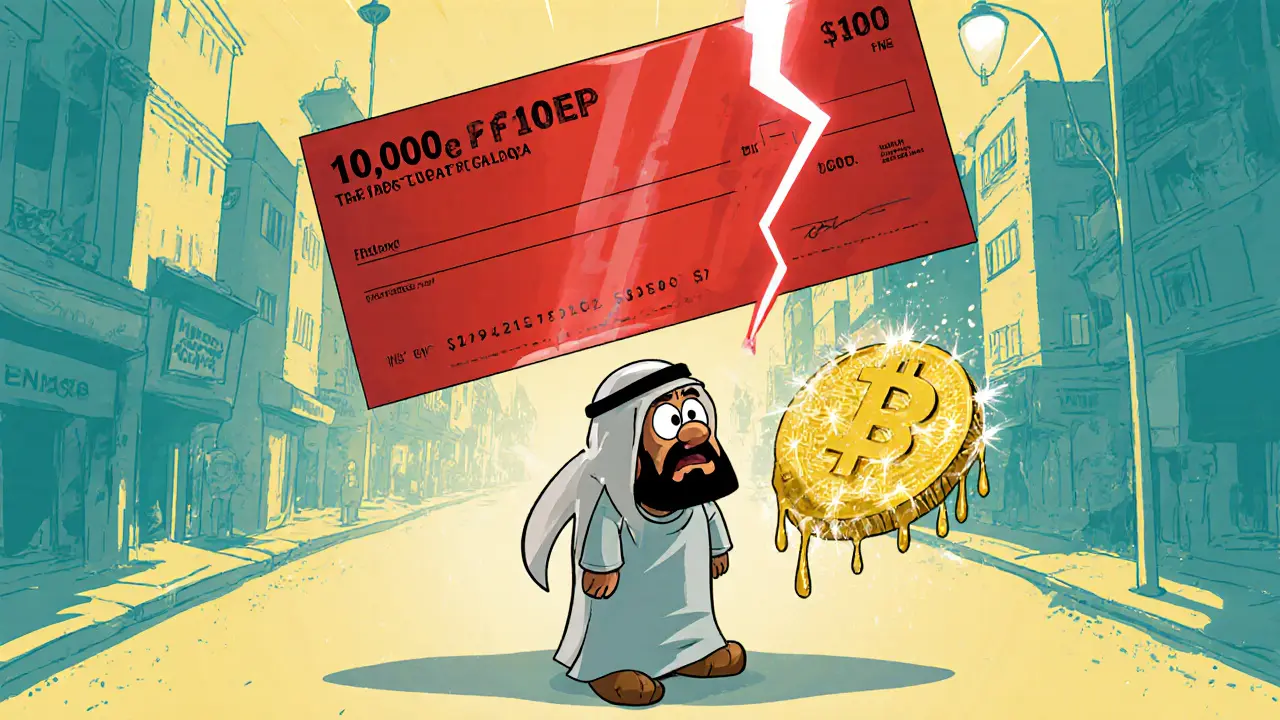
Egypt Crypto Fine Calculator
Egypt's crypto trading fines range from 1 million to 10 million EGP. For reference, the average monthly salary in Egypt is approximately 12,000 EGP (as of 2025).
This calculator shows how many months of salary each fine amount equals.
Calculation Results
Equivalent to 0 months of average salary
Imagine being hit with a fine that could wipe out ten years of earnings just for buying a digital coin. In Egypt, that nightmare is real - the government can slap traders with penalties ranging from 1million to 10million Egyptian pounds (about $51,600 to $516,300) under a strict legal regime. This article breaks down what the law says, who enforces it, and how the hefty fines affect everyday users and businesses.
Key Takeaways
- The ban on cryptocurrency in Egypt is codified in Law No.194 of 2020, which criminalizes issuance, trading, promotion, and operation of crypto services.
- Violators face imprisonment plus a fine between 1million and 10million EGP, regardless of whether they trade, promote, or simply hold digital assets.
- The Central Bank of Egypt (CBE) and the Egyptian Financial Regulatory Authority (FRA) are the two bodies driving enforcement.
- Despite the crackdown, Egypt ranks among the highest crypto‑using nations in the Middle East, with nearly 1.8million owners as of 2022.
- Businesses that need cross‑border payments must rely on traditional banking channels, which are slower and more expensive than crypto‑based alternatives.
What the Law Actually Says
The cornerstone is Article206 of Law No.194, which explicitly criminalizes any activity involving virtual currencies. The text reads:
"Anyone who issues, trades, promotes, or operates a cryptocurrency exchange without a license shall be subject to imprisonment and a fine of no less than 1million EGP and no more than 10million EGP, or either of these penalties."
In practice, the law does not differentiate between a small‑scale trader and a company running an exchange - both fall under the same penalty band.
Penalty Structure: Money, Time, or Both?
The regulation gives courts discretion: a judge can impose the fine, the jail term, or both. Typical sentencing patterns observed in 2023-2024 cases show:
- First‑time individual offenders: often a fine around 2million EGP plus up to six months in prison.
- Repeated or organized‑crime cases: fines climb to the 8‑10million EGP range, with imprisonment stretching to three years.
- Corporate entities: the fine is calculated on a per‑offense basis, quickly reaching the upper limit if multiple transactions are involved.
For context, the average monthly salary in Egypt in 2025 is roughly 12000EGP, meaning a 1million‑EGP fine equals about 83 months of income.

Who Enforces the Ban?
Two agencies act as the enforcement backbone:
- Central Bank of Egypt (CBE): Issues public warnings, monitors banking channels for crypto‑related transactions, and can freeze accounts linked to illicit trading.
- Egyptian Financial Regulatory Authority (FRA): Polices capital markets, enforces compliance with Capital Market Law No.95 of 1992, and maintains a "negative list" of unlicensed crypto promoters.
Both bodies coordinate through a shared reporting portal where citizens can tip off authorities about suspicious online ads or social‑media posts promoting crypto investments.
Real‑World Impact on Users and Businesses
Even with the risk of massive fines, a surprising 1.75% of Egyptians own crypto - roughly 1.8million people (TripleA, 2022). Why the disconnect?
- Financial Inclusion: Many turn to crypto to hedge against inflation and limited access to foreign currency.
- Remittances: Workers abroad find crypto cheaper for sending money home compared to traditional remittance services.
- Speculation: Young investors chase high‑return tokens despite the legal danger.
Businesses feel the pinch too. International partners often prefer crypto for fast, low‑fee settlements. Egyptian firms now have to route payments through correspondent banks, adding 2‑5days and extra fees, which can erode profit margins on export contracts.
Compliance Checklist for Residents and Companies
If you’re operating in Egypt, follow this quick guide to stay on the right side of the law:
- Do not buy, sell, or exchange any cryptocurrency on an unlicensed platform.
- Verify that any financial service you use is approved by the FRA under Capital Market Law No.95.
- Keep records of any crypto‑related communications - authorities may request them during investigations.
- If you receive a crypto‑related offer via social media, report it through the CBE’s online portal.
- Consider alternative legal hedges, such as foreign‑currency accounts approved by the CBE, instead of crypto.

What Happens If You’re Charged?
Legal counsel familiar with Egyptian criminal law is essential. Typical steps include:
- Immediate suspension of the alleged activity.
- Retention of a lawyer to challenge the evidence - many cases hinge on digital footprints that can be disputed.
- Negotiation for a reduced fine; courts sometimes accept community service in lieu of part of the fine.
- Payment plans may be arranged for fines exceeding 5millionEGP, but they rarely reduce the imprisonment component.
Remember, the penalty framework is designed to act as a strong deterrent, so early cooperation can make a big difference.
| Fine Tier | EGP Amount | US$ Approx. | Months of Avg. Salary |
|---|---|---|---|
| Minimum | 1,000,000 | 51,634 | 83 |
| Mid‑range | 5,000,000 | 258,170 | 417 |
| Maximum | 10,000,000 | 516,340 | 834 |
Looking Ahead: Will the Ban Stay?
Global trends are moving toward regulated crypto frameworks. The European Union’s MiCA regulation and the U.S. “BitLicense” model show that governments can both curb abuse and harness innovation. Egypt’s current stance isolates it from that wave, but pressure from fintech startups and the diaspora could spark a policy review within the next few years. Until then, the hefty fines remain the most powerful enforcement tool.
Frequently Asked Questions
What exactly is prohibited under Law No.194?
The law bans issuance, trading, promotion, and operation of any cryptocurrency exchange or platform without a license from the Egyptian authorities. It also covers advertising, fundraising, and even holding crypto on unregistered wallets.
Can I be fined for merely holding Bitcoin in a foreign wallet?
Holding crypto alone isn’t explicitly listed, but the CBE interprets possession as a form of “trading” if the assets are accessible for sale. In practice, many users have been investigated solely for ownership.
How do the fines compare to other countries in the region?
Egypt’s fines are among the highest in the Middle East. Saudi Arabia imposes fines up to 500,000SAR (≈$133,000) and Morocco caps at 500,000MAD (≈$55,000). The Egyptian range of up to 10millionEGP is significantly larger.
Is there any legal way to invest in crypto from Egypt?
Only if you use a foreign‑registered, FRA‑approved fund that complies with Capital Market Law No.95. Direct peer‑to‑peer trading or using a local exchange is illegal.
What should I do if I receive a notice from the CBE?
Contact a criminal defense lawyer immediately, cease all crypto‑related activities, and preserve any communications that might prove intent was not malicious. Cooperation often leads to reduced penalties.
Bottom line: Egypt’s crypto ban is backed by severe fines that can cripple anyone who ignores it. Whether you’re a casual holder or a fintech startup, understanding the law and staying compliant is the only safe route until the regulatory landscape shifts.





